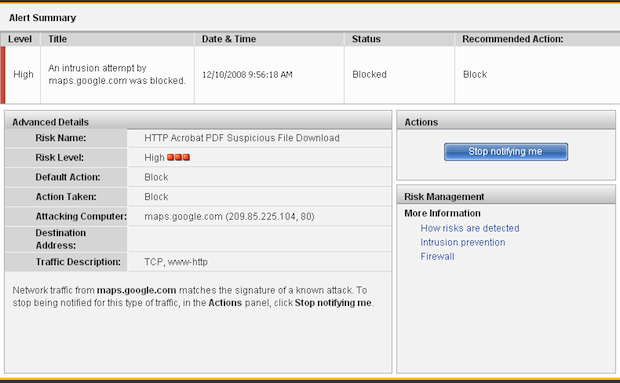- May 3, 2011
- 3,893
Summary: Anti-virus maker Symantec is charged in a lawsuit with misleading users into purchasing full versions of its software by peddling ’scareware’ tactics.
Security firm Symantec is being taken to court over claims that the company’s flagship anti-malware and performance software suites mislead consumers into buying full versions of its products.
The suit, which seeks class action status, was brought by Washington state resident James Gross. It was filed in the District Court of San Jose, California on Tuesday on behalf of his lawyers, according to Reuters.
The complaint alleges that misleading ’scare’ tactics are being used by Symantec in its Norton Utilities, PC Tools Registry Mechanic, and PC Tools Performance Toolkit products. The claims also suggest the software range always report harmful errors, privacy risks and other issues that exist, regardless of whether they actually exist.

Many ’scareware’ tactics used by online scammers intercept websites and display within the browser a simulation of an anti-virus scan, that invariably tells the user that the PC they are using is infected.
“The software is falsely informing the consumer that errors are high priority and in addition it is falsely informing the consumer that their overall system health and privacy health is low”, the complaint stated.
“The truth, however, is that the scareware does not actually perform any meaningful evaluation of the user’s computer system, or of the supposed ‘errors’ detected by the software”.
One analyst said that the claims would be difficult to prove. Andy Kellett, senior analyst at Ovum, said speaking to The Inquirer: “It’s a tricky one as there are lots of unknowns, how do you prove Symantec is in the wrong?”, adding: “It’s not something that has been done before”.
The news comes only a week after Symantec confirmed an Indian hacker group hacked a “third-party” and acquired source code relating to an enterprise anti-virus solution the company once offered.
While the lawsuit will likely go Symantec’s way, it is nevertheless been a bad month for the security firm.
A Symantec spokesperson said it was “aware” of the allegations made, but declined to offer additional comment at the time of publication.
Source
Security firm Symantec is being taken to court over claims that the company’s flagship anti-malware and performance software suites mislead consumers into buying full versions of its products.
The suit, which seeks class action status, was brought by Washington state resident James Gross. It was filed in the District Court of San Jose, California on Tuesday on behalf of his lawyers, according to Reuters.
The complaint alleges that misleading ’scare’ tactics are being used by Symantec in its Norton Utilities, PC Tools Registry Mechanic, and PC Tools Performance Toolkit products. The claims also suggest the software range always report harmful errors, privacy risks and other issues that exist, regardless of whether they actually exist.

Many ’scareware’ tactics used by online scammers intercept websites and display within the browser a simulation of an anti-virus scan, that invariably tells the user that the PC they are using is infected.
“The software is falsely informing the consumer that errors are high priority and in addition it is falsely informing the consumer that their overall system health and privacy health is low”, the complaint stated.
“The truth, however, is that the scareware does not actually perform any meaningful evaluation of the user’s computer system, or of the supposed ‘errors’ detected by the software”.
One analyst said that the claims would be difficult to prove. Andy Kellett, senior analyst at Ovum, said speaking to The Inquirer: “It’s a tricky one as there are lots of unknowns, how do you prove Symantec is in the wrong?”, adding: “It’s not something that has been done before”.
The news comes only a week after Symantec confirmed an Indian hacker group hacked a “third-party” and acquired source code relating to an enterprise anti-virus solution the company once offered.
While the lawsuit will likely go Symantec’s way, it is nevertheless been a bad month for the security firm.
A Symantec spokesperson said it was “aware” of the allegations made, but declined to offer additional comment at the time of publication.
Source


